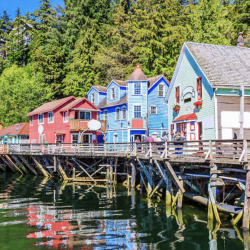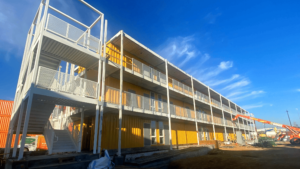The hospitality industry thrives on innovation, adaptability, and meeting the ever-evolving needs of travelers. In this pursuit of growth and modernization, hotels often face the challenge of expansion while maintaining efficiency and quality. As the demand for accommodation continues to surge, hotels find themselves exploring new avenues for expansion that offer speed, cost-effectiveness, and sustainability. In this quest, prefab commercial buildings have emerged as a compelling solution, revolutionizing the way hotels approach their expansion endeavors.
Introduction to Prefab Commercial Buildings
Prefabricated or prefab commercial buildings are structures that are manufactured off-site in sections and then assembled on-site. This method contrasts with traditional construction, offering numerous advantages such as speed of construction, reduced waste, and enhanced quality control.
Hotels are increasingly turning to prefab buildings for expansion due to several reasons that align with their goals of providing quality service, managing costs, and minimizing disruptions. Let’s delve deeper into why hotels should seriously consider prefab commercial buildings when contemplating expansion strategies.
Speedy Construction and Reduced Downtime
Time is of the essence in the hospitality industry. Traditional construction methods often entail lengthy project timelines, leading to prolonged downtime and revenue loss for hotels during the construction phase. Prefab buildings, on the other hand, offer a much faster construction process.
Prefab structures are manufactured concurrently with site preparation, significantly reducing the overall construction timeline. Modules or sections of the building are fabricated off-site, enabling parallel processes and ensuring a swift assembly once they reach the location. This rapid construction minimizes disruption to ongoing hotel operations, allowing for a quicker return to full functionality and revenue generation.
Cost Efficiency and Predictability
Cost management is a crucial aspect of any expansion project. Prefab commercial buildings can provide substantial cost savings compared to traditional construction methods. The streamlined manufacturing process in a controlled factory environment reduces material waste, labor expenses, and project delays caused by weather or other external factors.
Additionally, the prefabrication process allows for greater predictability in budgeting and scheduling. Hotel owners and managers can have more accurate cost estimates and timelines, mitigating the risks of unforeseen expenses or delays commonly associated with on-site construction.
Quality Control and Consistency
Maintaining high-quality standards is paramount in the hospitality industry. Prefab commercial buildings undergo rigorous quality control measures during the manufacturing process. The controlled factory environment ensures precision in construction, with standardized techniques and materials used across all modules.
Furthermore, the consistency in production guarantees uniformity in the finished product. Hotels can expect the same level of quality and design in each prefab module, ensuring a cohesive and aesthetically pleasing final structure.
Sustainability and Environmental Benefits
In an era where sustainability is a global priority, prefab commercial buildings offer several environmental advantages. The manufacturing process generates less waste due to optimized material usage and recycling practices. Additionally, the controlled environment in factories allows for better energy efficiency and reduced environmental impact compared to traditional construction sites.
Furthermore, some prefab building materials are eco-friendly and sustainable, aligning with the growing demand for environmentally conscious practices in the hospitality sector. Hotels can leverage this eco-friendly image to attract environmentally conscious travelers, thereby enhancing their brand value.
Flexibility in Design and Customization
Contrary to misconceptions, prefab commercial buildings offer a considerable degree of flexibility in design and customization. Architects and designers can create bespoke modular structures that meet the unique requirements and aesthetics of a hotel.
From guest rooms to common areas, the design possibilities with prefab buildings are vast. Hotels can integrate specific features, branding elements, and amenities seamlessly into the modular design, ensuring a tailored expansion that aligns with their vision and brand identity.
Conclusion
The hospitality industry is constantly evolving, and hotels seeking expansion must adapt to changing trends and demands. A prefab commercial building presents a compelling solution for hotels aiming to expand swiftly, efficiently, and sustainably.
With their advantages in speed, cost efficiency, quality control, sustainability, and design flexibility, prefab buildings offer a promising avenue for hotels to grow their infrastructure while maintaining operational excellence. Embracing the innovation of prefab construction could be the key for hotels to unlock their expansion potential and elevate guest experiences in the ever-competitive hospitality landscape.


